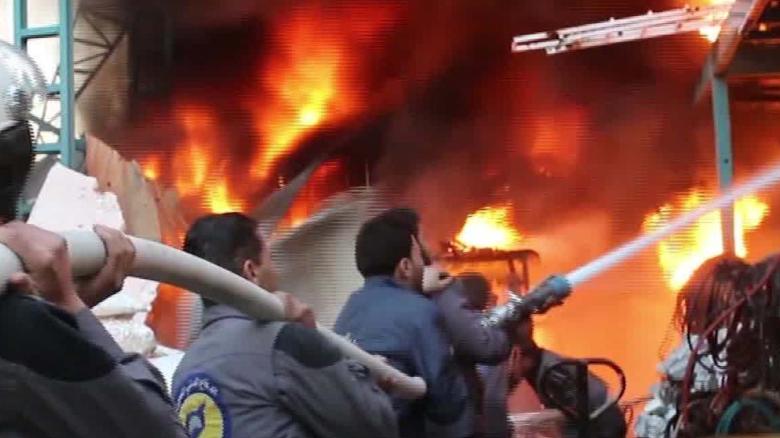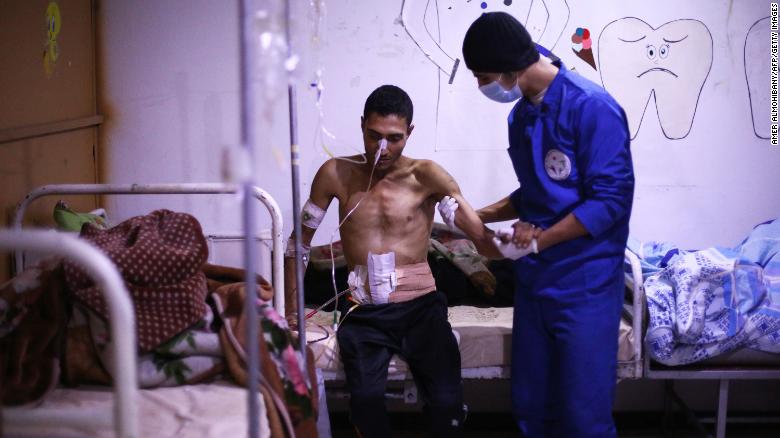Chlorine gas symptoms reported in Eastern Ghouta after Syrian airstrikes
By Jamie Tarabay and Jomana Karadsheh, CNN
Updated 1105 GMT (1905 HKT) February 26, 2018
(CNN)Several people in Eastern Ghouta were treated for exposure to chlorine gas, opposition groups said, as airstrikes and artillery fire from the Russian-backed Syrian regime continued Sunday despite a United Nations ceasefire.
The Syrian opposition-run Rural Damascus Health Directorate said the people were admitted to medical facilities showing signs that were consistent with exposure to "toxic chlorine gas." In a statement RDHD added that 'the smell of people in the area, ambulance drivers, and victims all had the clear and known smell of chlorine gas."
A tweet from the Syrian American Medical Society said that 16 patients, including six children, were treated in a hospital "suffering from symptoms indicative to exposure to chemical compounds."
CNN is unable to independently verify claims that chlorine was used as a weapon in Eastern Ghouta on Sunday.
Both sides of the Syrian conflict have in the past accused one another of the use of chlorine as a weapon. The Syrian government has repeatedly denied claims that it has used chlorine as a weapon on civilians.
A medic assists a Syrian man who was wounded in air strikes at a make-shift hospital in the rebel-held enclave of Eastern Ghouta on February 25, 2018.
The Russian Defense Ministry also alleged Monday during a press briefing with journalists that "terrorists" hiding in Eastern Ghouta have chemical substances which "might be used for provocations."
'Nothing has changed'
The alleged chlorine attack comes despite a 30-day ceasefire that was supposed to have been implemented "without delay."
"Nothing has changed," said Dr Hamza Hassan from Arbeen Hospital in the besieged Damascus suburb. "The airstrikes are continuing. A maternity hospital has just been hit in Saqba (a town in Eastern Ghouta) and is out of service," he told CNN on Sunday morning.
Panos Moumtzis, the UN Humanitarian Coordinator for the area, told CNN: "We have reports at least seven people were killed this morning" after the UN Security Council adopted the resolution calling for a 30-day ceasefire in Syria on Saturday.
For the first time in this latest offensive that began February 18, ground attacks were combined with aerial bombardment, pummeling the rebel-held enclave near the Syrian capital.
The Syrian regime has said that it is targeting terrorists in Eastern Ghouta and that it would continue to pursue terrorist targets even with the ceasefire in place.
"We practice a sovereign right of self-defense, and we will continue to fight terrorism wherever it is found on Syrian soil," Syrian UN ambassador Bashar Ja'afri said according to Syrian state-run media SANA.
Terrorist groups not included
The UN ceasefire resolution, which passed unanimously on Saturday, noted that the "cessation of hostilities shall not apply to military operations against the Islamic State," al Nusra and other groups associated with them, or groups deemed terrorist organizations by the UN Security Council.
Voices from Syria's Eastern Ghouta
Voices from Syria's Eastern Ghouta 01:33
The main rebel units actively holding territory in Eastern Ghouta are Islamist groups Jaish al Islam and Faylaq al Rahman, who have taken part in peace negotiations in the past. According to activists there are small pockets of Hayat Tahrir Al Sham, an al-Qaeda affiliate, still in the area.
But the ceasefire had no specific beginning, only that it was to come into effect "without delay." There was no deadline for setting a date for it to begin. And there was no detail on how the truce, once in effect, would be enforced.
Both the Syrian Observatory for Human Rights and SANA reported that shells hit regime-controlled areas in Damascus on Saturday morning. "Armed groups positioned in Eastern Ghouta on Saturday targeted with more than 55 mortar and rocket shells with sniper fire the residential neighborhoods in Damascus and its countryside, injuring a number of civilians and causing material damage," SANA said. SANA also reported that 21 rocket shells were fired on residential neighborhoods in Damascus City and other areas in the capital.
'Deeply skeptical'
Speaking to reporters, Russia's ambassador to the UN, Vassily Nebenzia, said the process of forming the resolution was "extensive and exhaustive" in order to ensure that "it was meaningful."
"Because by decrees of the Security Council, you cannot install a ceasefire, (a) ceasefire is reached by laborious and painstaking process on the ground," said Nebenzia.
Haley: We are late to respond to Syrian crisis
Haley: We are late to respond to Syrian crisis 02:03
However, US Ambassador to the UN Nikki Haley refuted Nebenzia's claims.
"In the three days it took us to adopt this resolution, how many mothers lost their kids to the bombing and shelling? How many more images did we need to see of fathers holding their dead children? All for nothing, because here we are voting for a ceasefire that could have saved lives days ago," said Haley in remarks made after the ceasefire resolution was adopted on Saturday.
"Our goal with this resolution is clear: The Assad regime needs to stop its military activities around eastern Ghouta, and for once, allow humanitarian access to all of those who need it," said Haley, adding that she was unconvinced the Syrian regime would honor the ceasefire.
"We are deeply skeptical that the regime will comply. But we supported this resolution because we must demand nothing less. We owe this to the innocent people of Syria begging for help."
US Ambassador to the UN Nikki Haley speaks as Russia's Ambassador to the UN Vasily Nebenzia listens after a Security Council vote during a UN Security Council meeting on a ceasefire in Syria February 24, 2018 in New York.
US Ambassador to the UN Nikki Haley speaks as Russia's Ambassador to the UN Vasily Nebenzia listens after a Security Council vote during a UN Security Council meeting on a ceasefire in Syria February 24, 2018 in New York.
In his remarks to the UN Security Council Nebenzia compared the outcry from the international community over events in Eastern Ghouta to that surrounding the re-taking of eastern Aleppo in December 2016.
"We know that the humanitarian situation in Syria is dire and requires urgent measures to be taken," he said. "However we see perfectly that the propagandistic scenarios which are being unraveled around Eastern Ghouta are in line fully with the campaign, the vociferous campaign in late 2016 during the counter-terrorist operation to liberate eastern Aleppo."
The airstrikes and artillery fire have concentrated on the outskirts of Eastern Ghouta, according to activists inside the city. more than 520 people have been killed and 2,500 wounded since the bombardment of Eastern Ghouta began on Sunday February 18.

Hi! I am a robot. I just upvoted you! I found similar content that readers might be interested in:
https://www.cnn.com/2018/02/26/middleeast/syria-ceasefire-violation-ghouta-intl/index.html
it's cool , I give you my vote if you want to give me your upvote, thank you in advance...